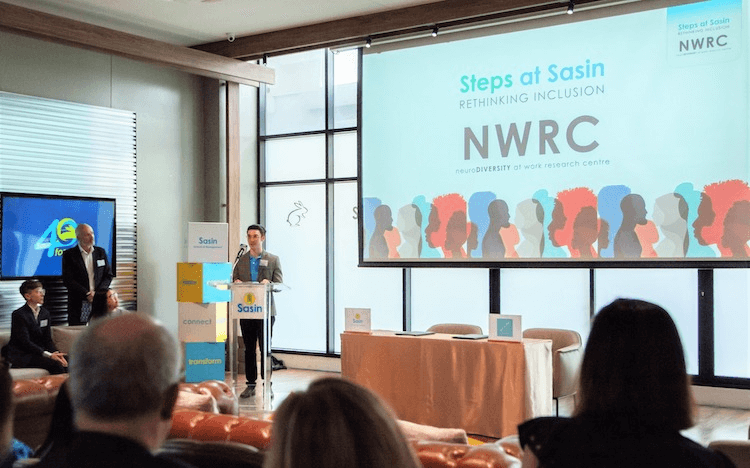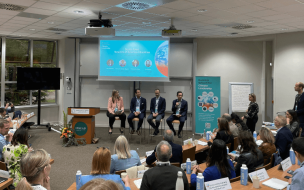Top business schools such as London Business School (LBS) and HEC Paris are becoming more aware of neurodivergence––or neurodiversity, as it is increasingly known. At LBS, specialist tutors adapt the learning process for neurodiverse students. For instance, those with dyslexia, which affects reading and writing, may convert written material into an audio file (or the opposite for dyspraxia, which affects co-ordination and movement).
HEC Paris has similarly implemented measures, such as accommodating colored paper for dyslexic people, as white can lead to higher levels of mix-up.
The French school, Grenoble Ecole de Management, has a Data Asperger program that is designed for people with ASD (Autism Spectrum Disorder). The program comprises a period of classes and a period in a company (four months of full-time courses before starting a 12-month placement). The program includes social skills workshops on communication, behavioral skills, and emotional management.
EY, the professional services firm, has designed a recruitment process for neurodivergent people that places less emphasis on interviews, which can be challenging to some people with ASD due to challenges of social communication, and instead includes performance-based tasks.
Some top companies have implemented initiatives and resources for hiring and retaining neurodivergent people. This includes JP Morgan, Dell, and Goldman Sachs. Goldman Sachs launched a Neurodiversity Hiring Initiative in 2019, which provides an eight-week paid internship program for neurodivergent individuals, that includes extensive training, coaching, and mentoring.
However, despite this emerging understanding and of inclusion initiatives, there is still a long way to go and a lot for the business sector to learn about neurodiverse students and employees. Companies still fail to recruit and retain neurodiverse candidates, and most classrooms are not equipped to accommodate those with neuro-disabilities adequately.
This is especially true in certain territories. In Southeast Asian countries, the accommodations for neurodiverse people in classrooms and companies are minimal.
To combat this Sasin School of Management in Thailand launched its Neurodiversity at Work Research Centre (NWRC), the first research center in Southeast Asia dedicated to connecting workers with disabilities to meaningful employment.
So, what is this new research center, and how can it create a safer environment for neurodiverse students in higher education and help them launch meaningful careers?
Thailand's neurodiversity stigma
Neurodiversity refers to diversity in the human brain and cognition, such as sociability, learning, attention, mood, and other mental functions. Conditions such as ADHD, autism, dyspraxia, and dyslexia all fall under the neurodivergent umbrella.
"These are a group of people that have structural neurological differences from neurotypical people or the average person, and that leads to them perceiving, feeling and interacting with the world in a very different way from neurotypical people," says Drew Mallory, Sasin's inclusion ambassador and director of research at the NWRC.
Drew explains how Thailand, like many other countries, has ingrained taboos and a stigma against neurodiverse conditions: "A person in Thailand might immediately question what they could have done wrong in a previous life, to have been cursed [with such a condition]."
These lead to significant barriers for neurodiverse people looking to enter the job market in Thailand.
"There are a number of barriers, and you combine that with certain cultural taboos against people with many different kinds of differences. And suddenly, you have individuals who aren't worthy of working," Drew explains.
Some governmental measures may unintentionally push the narrative of ''otherness'' when it comes to neurodiverse people, such as a card that identifies them as disabled. The card entitles the children to welfare and state services provided to disabled people. However, fewer than 4,000 autistic children have registered nationwide.
Parents are reluctant to register children for this card as, first, the Social Development and Human Security Ministry defines autism broadly as either a disorder of emotions or behavior. The equivocal definition is open to interpretation and gets in the way of proper state assistance.
Secondly, the card brings stigma, and parents are wary of the lifelong label of "disabled".
Why did Sasin set up its Neurodiversity at Work center?
Drew explains that the center is trying to re-examine what it means to be neurodiverse and impart understanding across the region to show benefits for workplaces of employing candidates with such conditions.
The NWRC is a collaborative project between Sasin and Steps – a Thai organization that provides education for neurodivergent people, models inclusive businesses, and empowers employers with the tools to hire inclusively.
"Steps wants to identify the unique abilities that each person has and help them maximize their potential and meet their goals," Drew says.
Neurodivergent people face barriers to working across the region. This is not only unjust but detrimental to businesses that could benefit from the untapped potential of an overlooked workforce.
"We need first to understand the abilities, the interests, the skills of people who are neurodiverse here, particularly in Bangkok.
"Once we can do that, especially using validated psychometric tools, we can create a matching system that will create training and employment opportunities and revolutionize the way people understand diversity and gain employment."
Bringing it to the classroom
Part of the scheme is bringing awareness to the business school and giving neurodivergent students a safe space where their needs are met and they feel comfortable coming out as neurodiverse.
NWRC is doing research and other projects, turning them into experiential learning opportunities for students to connect with topics and better understand the neurodiverse.
Drew also runs a course that addresses emotional intelligence. He tries to impart a new understanding of emotional intelligence to his students, one which includes neurodiverse people.
Drew shows clips of neurodiverse people interacting or talking about their own experiences. He will then ask people for their impressions, such as whether someone autistic, for example, displays lower emotional intelligence?
"The key here is to feed them a perspective but allow them to think about what they're seeing and experiencing and question whether their intuitive responses are correct."
Alongside this, Sasin hosts events to widen perspectives.
"We host conferences; we host panels. We bring people in from the outside, so they can interact with neurodiverse people and other advocates."
Changing perspectives
Sasin has researched and developed studies to help better identify how neurodiverse people can achieve employment in Thailand, and how to help companies understand the advantages neurodiverse people can bring to companies.
"We want a sustainable and meaningful pipeline to work, where people are diverse and doing the jobs they want. For that to happen, there must be those jobs, to begin with," Drew explains.
NWRC has worked with a hospitality group to survey 1200 people across five major hotels in Bangkok on attitudes toward people with disabilities and neurodiverse conditions.
This was to help develop training to better incorporate neurodiverse needs in employment and to present how neurodiverse people could be an asset in companies.
The center is looking to use the research to help build a meaningful employment pipeline.
"The next stage is to develop it into special training that can be given to management and department leaders, and eventually that will percolate down through an industry-wide campaign to help prepare businesses to be neurodiverse friendly employers in the future."
The training will help identify neurodivergent friendly jobs and to show what work could easily be done by someone who is neurodiverse.
"We have to teach companies what it means to have a neurodiverse friendly job and to build diversity policies," Drew says.
Redefining the conversation and changing perspectives is a primary goal for the research center. This includes showing the business schools how to create safer spaces for neurodiverse students—which can include offering quiet rooms to avoid overwhelm, which is challenging for many ASD people—and enlightening companies on the jobs that can be done equally, if not better, by neurodiverse people. Attention to detail or finding unexpected solutions, for example, can be a strength among people who are autistic.
"We want to redefine this conversation, help people understand that disability as it pertains to this group of people as environmental.
That we're not talking about people who have definitive states that make them incapable of work; we're talking about people who require, if anything, very, very small changes to the work environment to make it a place in which they can thrive.







